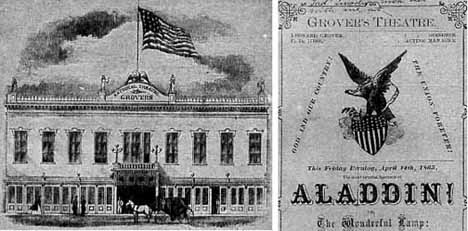
Grover’s Theater, Washington D.C.
[Today is Lincoln’s Birthday, but perhaps it is useful to remember his death as well…]
April 14, 1865. For Americans, at least above the Mason Dixon line, this is one of those dates that live in infamy. John Wilkes Booth, a rather bad actor on the stage, shot President Abraham Lincoln at Ford’s Theatre. According to an account by Mrs. Helen Palmes Moss in The Century Illustrated Monthly Magazine for 1909, Lincoln had the option of going to a rival theatre, the National or Grover’s, that night where a private box had been prepared for him by Mr. C. D. Hess, the co-manager. Apparently Booth had planned to attempt the assassination at whichever theater Lincoln attended. He much preferred Ford’s, since he had no inside help at the National and would have to shoot Lincoln as he stepped out of the carriage. What does this fateful event have to do with the Middle East? If Lincoln had attended the National Theatre and J. Wilkes Booth had missed, the President would have seen a dramatization of the Arabian Nights tale ‘Aladdin.’ Would that Lincoln had been more of an Orientalist?¦
Mrs. Moss recollects:
“Mr. C. D. Hess was my brother-in-law, and consequently I enjoyed great privileges at the theater and often attended.
“Wallack and Davenport had been playing a series of Shakspearian plays that were a joy to the President, who dearly loved tragedy. Mr. Hess had counted on having him at the performance of ‘Aladdin,’ and naturally was anxious as Booth to learn the result of his note [of invitation to the new play]. It was a glorious morning. Bands were playing all about; everything was in gala attire. Mrs. Hess and I decided to take a walk, the objective point being the theater office, for we, too, were curious to know whether ‘the boys’ as we called them would have the honors.
“On entering, the first one we saw was J. Wilkes Booth. I can see him now, handsome, with piercing black eyes, rather long, wavy hair, black as night, a fascinating theatrical air of self-consciousness, as if he were only to be seen to be admired, and wearing a long, light-colored overcoat which capped the climax of style. We were much flattered to take his hand in greeting. the messenger boy returned with a note written by Mrs. Lincoln, who usually responded to the president’s personal notes. In effect it said: He sends his regrets that the invitation was not sent earlier, as he much preferred the Shaksperian play Wallack and Davenport were giving to the comedy ‘Our American Cousin,’ which was being played by Laura Keene; unfortunately he had accepted the invitation from Ford’s. Another time he would be glad to avail himself an opportunity to hear them; but his son Tad and his tutor would be glad to accept.’
“Of course this was a great disappointment to the management, but it was received with joy by Booth, who soon after left to complete his plans for the attack at Ford’s theater. My sister-in-law and myself left soon after Booth, and finding ourselves in the neighborhood of the White House, it occurred to us that we had a standing invitation to visit its conservatory, and so decided to make our call then.
“Stepping into the White House, we were not surprised to meet the President in the corridor, as we had noticed his carriage at the door. He courteously turned to us, shook hands, and asked our names. Recognizing that of Mrs. Hess, he again expressed regret at his inability to accept her husband’s invitation. While talking, he had turned with us toward the conservatory, as we had explained our presence and destination. Asking us if we had seen his favorite lemon-tree, he conducted us to it. It was indeed a beauty, a perfect mass of fruit and flowers. In answer to the question whether he was not feeling very happy over the glorious news, he replied, “Yes, Madam; for the first time since this cruel war began, I can see my way clearly.” Such a tender look was in his deep-set eyes as he uttered those words! Poor man! we little knew that a few minutes before we had shaken the hands with his murderer. After requesting the gardener, our old Scotch friend whose invitation we had accepted, to gather us some flowers, and picking us a lemon from his favorite tree, the President left us. Those flowers we were wearing that night at the national Theater when the dreadful news was announced. The lemons were kept for years. One was finally lost; but the other, shriveled like a nut, is still treasured.”
“Tad and his tutor were early on hand, and were seated well in front, as all the boxes had been sold.”
“Our seats were somewhat in the rear. After the play had fairly opened, during some scene-shifting, and while the stage was deserted, a messenger came to us from the management: “Leave your seats quietly, and stand back by the door. President Lincoln has been shot at Ford’s Theatre. Mr. Hess is going before the curtain to announce it, and close the house at once. Stand back lest there be a rush for the door.”
“The house was as still as death. One could have heard a pin drop. The dazed look upon the faces! All were simply stunned for a moment. then they rose as one body, and passed out toward the door, as if in the presence of death.”
[Excerpts from Helen Palmes Moss, “Lincoln and Wilkes Booth as Seen on the Day of the Assassination,” The Century Illustrated Monthly Magazine 77:6:951-952, 1909.]
[Tabsir Redux is a reposting of earlier posts on the blog, since memories are fickle and some things deserve a second viewing. This post was originally made on April 14, 2008]